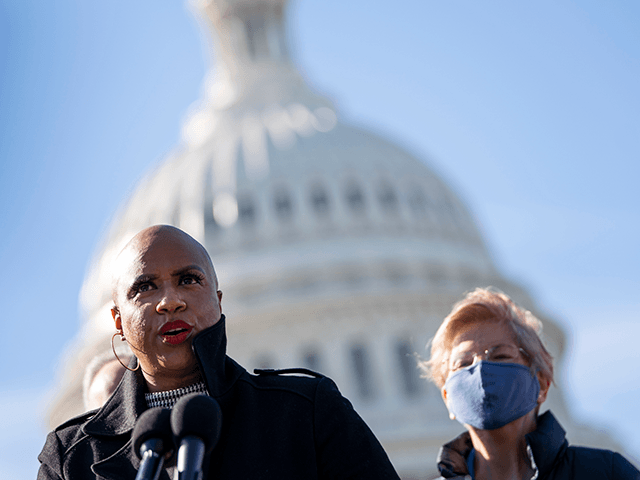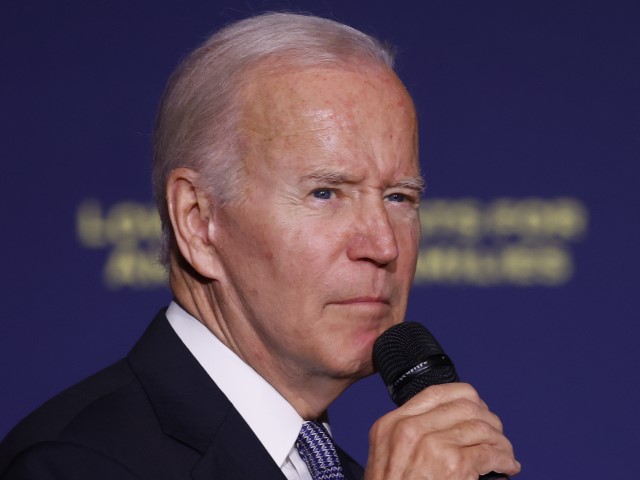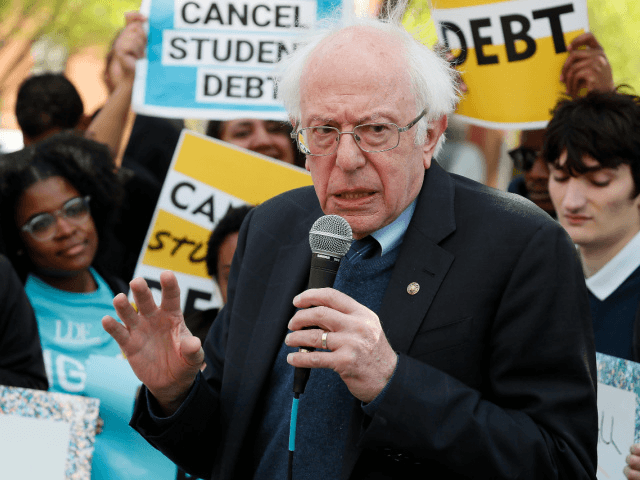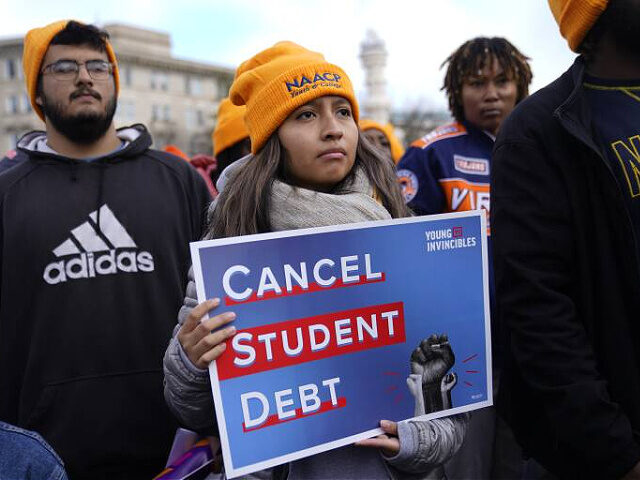Joe Biden’s attempt to transfer student debt appears likely never to move forward even if the Supreme Court dismisses the current challenges because the authority he cites will expire when he ends the national coronavirus emergency declaration this spring.
The Supreme Court heard two consolidated challenges to the Biden administration’s student debt transfer, which effectively forces Americans without college degrees to pay for the degrees of, on average, wealthier Americans. Those legal challenges have, through lower courts, blocked the plan to cancel up to $20,000 of federal student loan debt for up to 40 million borrowers.
One case, brought by six Republican-led states, argues that states would be deprived of revenue because the loan forgiveness plan would encourage borrowers to consolidate their loans into the federal direct loan program.
The other case, brought by two borrowers represented by the Job Creators Network, argues that the program was set up with arbitrary rules for eligibility and did not follow regulatory procedures like notice-and-comment.
Despite that, the Biden administration’s plan was chiefly authorized by the Higher Education Relief Opportunities for Students (HEROES) Act of 2003, which gave the Department of Education broad power to “modify” or “waive” federal student financial assistance programs “as the secretary deems necessary in connection with a war or other military operation or national emergency.”
If Biden does not renew the federal coronavirus emergency declaration, the Education Department would be stripped of its ability to cancel debt under the authority of the HEROES Act.
“The [Education] Secretary here asserts a breathtaking power to do anything that he thinks might reduce the risk of borrowers defaulting, even years after a national emergency arises,” Nebraska Solicitor General James Campbell said in his opening remarks. “He needs clear congressional authorization for such power.”
“The [HEROES] Act permits the Secretary to waive or modify existing provisions because of a national emergency,” he continued. “It does not permit him to rewrite existing provisions to create a new program that covers 95 percent of borrowers and applies to them regardless of how the pandemic affected them.”

Rep. Ayanna Pressley (D-MA) speaks as Sen. Elizabeth Warren (D-MA) looks on during a press conference about student debt outside the U.S. Capitol on February 4, 2021, in Washington, DC. The group of Democrats re-introduced their resolution calling on President Joe Biden to take executive action to cancel up to $50,000 in debt for federal student loan borrowers. (Photo by Drew Angerer/Getty Images)
Asking U.S. Solicitor General Elizabeth Prelogar about the “major questions doctrine” — which involves “both separation of powers principles and a practical understanding of legislative intent” as well as requires Congress to be explicit in its authorizations for agencies to make “decisions of vast economic and political significance” — Chief Justice John Roberts appeared to suggest he might vote against the Biden administration if the Court were to rule on the merits.
“You’re arguing here that no notice-and-comment proceeding was required before the action taken on the half trillion dollars of loans and that because of your view that the President can act unilaterally, that there was no role for Congress to play in this either, and at least in this case, given your view of standing, there’s no role for us [the Court] to play in this,” Roberts, who is favorable to the separation of powers arguments, said.
“Now we take very seriously the idea of the separation of powers and that power should be divided to prevent its abuse, and there are many procedural niceties that have to be followed for the same purpose,” he continued, likening the case to when the Court struck down former President Donald Trump’s attempt to end the DREAMers program.
Roberts focused much on the enormous amount of money the student loan program deals with — meeting both “vast economic and political significance” issues for “major questions.”
“This is a case that presents extraordinarily serious, important issues about the role of Congress and about the role that we should exercise in scrutinizing that,” he said. “I think most casual observers would say, ‘if you’re going to give up that much amount of money, if you’re going to affect the obligations of that many Americans on a subject that’s of great controversy, they would think that’s something for Congress to act on.'”
“If they haven’t acted on it, then maybe that’s a good lesson to say for the President or — or the administrative bureaucracy that maybe that’s not something they should undertake on their own,” he continued.
Justice Brett Kavanaugh appeared to agree with the Chief Justice and questioned the “general language” used in the HEROES Act, such as “waive” and “modify,” on which the government stakes its claim.
“That leaves us with a situation that I think we’ve seen before: an old statute with kind of general language, Congress specifically considering the present issue repeatedly but not, as you acknowledge, passing legislation that would authorize the specific action and then, in the wake of Congress not authorizing the action, the executive, nonetheless, doing a massive new program,” he said of administrations taking advantage of vague statutes for expansions of authority.
“Some of the biggest mistakes in the Court’s history were deferring to assertions of executive emergency power,” Kavanaugh continued. “Some of the finest moments in the Court’s history were pushing back against presidential assertions of emergency power. And that’s continued not just in the Korean War but post-9/11 in some of the cases there.”

U.S. President Joe Biden gives remarks on student debt relief at Delaware State University on October 21, 2022, in Dover, Delaware. (Anna Moneymaker/Getty Images)
Justice Sonia Sotomayor, however, pushed back on the “major questions” issue, saying the issue was not about the price, but about the Education Secretary’s authority under the HEROES Act.
“It’s an outrageous sum, and yet no one is disputing that,” she said “The secretary has that power. It’s not the amount of money, the question is what’s Congress’s intent?”
But before the Supreme Court can rule on the legal merits of the case, it must first determine whether the plaintiffs had standing to sue.
The focus for this is on the Missouri Higher Education Loan Authority (MOHELA), one of the country’s largest loan guarantors and servicers.
Prelogar, arguing on behalf of the debt transfer program, presented to the Court the government’s belief that the six states challenging the program do not have standing.
While the states argue that the program would deprive them of revenue by encouraging student loan borrowers to consolidate state-backed loans into the federal direct lending program, Prelogar told the justices that the assertion of a third-party injury — does not give states standing to sue.
Under Missouri law, MOHELA, which is not a party in the case, is required to contribute a certain amount to the state treasury. States assert the relief program would restrict MOHELA’s ability to fulfill that obligation, thereby giving states standing to sue for their injury.
However, the federal government argued in its brief that such a system for standing is untenable.
“If A causes financial harm to B, and B owes money to C, C has standing to sue A,” the brief states. “That theory of standing is irreconcilable with the principle that a plaintiff must ‘assert [its] own legal rights and interests, and cannot rest [its] claim to relief on the legal rights or interests of third parties.'”
In addition, three states assert a diminishment of their tax revenues because the Internal Revenue Code treats the “‘discharge of indebtedness’ as a form of ‘gross income,'” that would not be seen by states until 2025. However, as the government argues, the states were not required to incorporate the IRS definition of “gross income” into their own statutes — something Prelogar said was a “self-inflicted” injury.
“The States have no obligation to track the federal definition of gross income; indeed, two of the six States that have brought this suit (Arkansas and Missouri) evidently do not do so,” the brief states. “The other States remain free to depart from that definition and to treat student loan discharges from 2021 to 2025 as taxable income for purposes of state income taxes.”
Several justices appeared skeptical of the states’ standing arguments.

Sen. Bernie Sanders (I-VT) joins student debtors to again call on President Biden to cancel student debt at an early morning action outside the White House on April 27, 2022, in Washington, DC. (Photo by Paul Morigi/Getty Images for We The 45 Million)
Effectively saying that Nebraska and Missouri lack standing, Justice Elana Kagan said that MOHELA itself “has the ability to sue and be sued.”
“It’s been set up as an independent corporate entity with the ability to bring suits on its own,” she continued. “Usually we don’t allow one person to step into another’s shoes and say I think that that person suffered a harm, even if the harm is very great.”
“Why isn’t MOHELA responsible for deciding whether to bring this suit?” she asked. Sotomayor was also skeptical.
As the states argue MOHELA is an arm of the Missouri government, Justice Amy Coney Barrett questioned, if that is the case, then why did the Missouri government not force MOHELA’s hand and make it a party in the case.
“Why didn’t the state just make MOHELA come then?” she asked. “If MOHELA is really an arm of the state and all of this would be a lot easier — I mean, the Solicitor General conceded that if MOHELA was here, MOHELA would have standing.”
“If MOHELA is an arm of the state, why didn’t you just strong arm MOHELA and say you’ve got to pursue this suit?” Barrett asked.
Standing is the primary issue for the second case as well.
On the merits, the suing party argues that the loan program is procedurally unworkable, as it did not go through notice-and-comment. If it had gone through such a procedure, the borrowers might have been able to raise the threshold of income under which borrowers are eligible for the program, they argue.
The borrowers’ argument is that because the Biden administration said student debt relief is a priority, then if the court strikes down this program, the education secretary will look around for another source of authority and would probably then cite the Higher Education Act for such authority.
That statute requires public notice-and-comment, during which time these borrowers would submit comments arguing for the Education Department to set the income threshold for benefits high enough to cover all of their debt.
Several justices seemed skeptical of this “bank shot” argument that included so much speculation about who might do what in the future, which Prelogar argued was too much of a stretch to establish standing to sue under Article III of the Constitution.
The cases are Biden v. Nebraska, No. 22-506, and Department of Education v. Brown, No. 22-535, in the Supreme Court of the United States.
Breitbart News senior legal contributor Ken Klukowski contributed to this report.
Breccan F. Thies is a reporter for Breitbart News. You can follow him on Twitter @BreccanFThies.

COMMENTS
Please let us know if you're having issues with commenting.